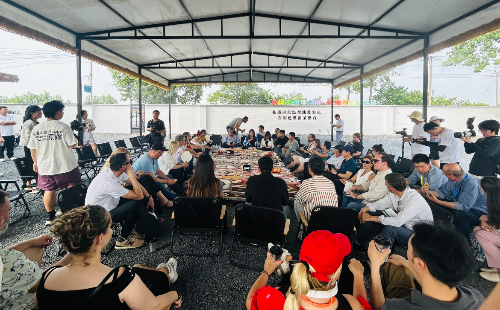Livelihood project pace ensured amid extreme weather
China's State-owned companies have secured their pace on key infrastructure projects, especially those concerning local livelihoods, despite recent weather hazards and inevitable challenges.
Extreme rain is on its way. All units, be prepared, announced Sun Yongqiang, a safety control officer of the China Railway 24th Bureau Group Corp Ltd, issuing a flood notice.
Situated in the heart of Zhejiang province, Yongkang South Railway Station found itself perched on the precipice of an impending deluge during the torrential rain caused by Typhoon Doksuri in China, which turned roads into rivers and trapped hundreds in the Yongkang city.
However, CR24, the builder of the station's supporting infrastructure project, successfully kept the construction site intact through rapid response and efficient precautionary measures.
All project members joined the local flood control operation to ensure overall safety and project progress, said Pei Bing, chief engineer of the supporting project.
"We fortified a flood barrier with two water pumps in advance for swift drainage. A mini-reservoir was also positioned below to intercept any water incursion beyond the flood barrier. By channeling excess water from the mini-reservoir into the city's floodways, we ensured robust flood control," Pei added.
The proactive measures and emergency response paid off handsomely. Although the heavy rain lasted for eight hours, no damage or injuries were caused to the project or CR24 employees.
"Time was not delayed" for the completion of the supporting project at the end of July, Pei said. The station, as a vital transportation nexus for the vibrant Yangtze River Delta region, is expected to not only facilitate the wanderlust of the residents, but also inject new growth momentum into its high-quality development.
As the last concrete slab was placed on the capping beam of a residential building on July 27, the renovation project of an old urban residential community entered its new chapter.
Also undertaken by CR24, the renovation project — located in Laiwu district of Jinan, capital of Shandong province — covers an area of 40 mu (2.68 hectares) and reaches a total construction area of 90,500 square meters. The completion of its capping work marks the solid foundation for future construction, according to a progress report from the builder.
The renovation project has been given significant importance since the beginning, due to its close linkage with people's livelihoods. Upon completion, it will provide approximately 600 housing units, effectively addressing urban residents' resettlement concerns.
To provide integrated solutions and facilitate occupancy once the residential complex is opened, the project encompasses a complete series of construction work, such as civil engineering, interior and exterior design, and installation of water, electricity and heating systems, leading to difficult construction conditions.
Although the intersecting work remains challenging, the building team aims to achieve timely delivery through smooth coordination, optimized construction procedures and reasonable scheduling. CR24 has also applied new approaches to reduce on-site operations, thereby minimizing material waste and environmental impacts.
The State Council, China's Cabinet, has approved guidelines on transforming and upgrading underdeveloped areas in megacities during an executive meeting in late July to support the economy. Jinan, with a population of over 9.4 million by the end of 2022, belongs to this category.
The transformation of such areas is a positive move to expand domestic demand and increase effective investment. Residential renovation often comes with a slew of supporting projects such as commerce, education, hospital and elderly care facilities, said Yang Weiyong, an associate professor of economics at the University of International Business and Economics.
"These renovation projects can not only meet demands at different levels and make up for imbalances in urban development, but also help expand domestic demand and optimize the current structure of the real estate sector," Yang added.
Citing the fixed-asset investment growth of 3.8 percent year-on-year in the first half, Long Chaocan, an investment consultant with China Galaxy Securities Co Ltd, said he expects further efforts to spur domestic demand and the national economy.
"With the figure standing at 5.1 percent in the first quarter, growth of the sector was on a downtrend in the second quarter, and not reaching market expectations. Considering the pressure weighing on the trade, more efforts in this sector would be advisable coming into the second half," Long said.
Better known for rail construction, CR24 is going the whole hog to support the nation's goals in upgrading its infrastructure, especially the national transportation network.
One of its latest efforts is the second Shanghai-Nanjing intercity high-speed railway, for which the company joined construction in 2018. The railway is nearing the end of the test phase and will start pilot runs this month and official operation by the end of September.
The new line will have trains running between Shanghai and Nanjing, Jiangsu province, journeying 279 kilometers at up to 350 kilometers per hour and stopping in eight cities along the way.
Zhang Xinyu and Ni Shuman contributed to this story.





 play
play